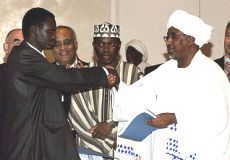Rebels signed peace deal under diplomatic, military pressures – analyst
May 6, 2006 (LONDON) — Sudan Liberation Movement/Army (SLM/A) – Minni Menawi faction signed the AU brokered Darfur Peace Agreement because of the diplomatic and military pressures, a Sudanese analyst said.

According to the head of the Africa Division at the International Crisis Group (ICG), Suleiman Baldo, the SPLA was under diplomatic pressure from the US mediators. He further said the last-minute modifications of the proposed deal allowed the integration of greater number of rebel SLA forces in the regular army.
On the military front, Baldo said SLA meant to avoid military assault. Khartoum was preparing to carry out a massif attack on the SLA forces in South Darfur. So Menawi was aware of the danger in case of collapse of the talks.
Below is the text of telephone interview with Suleiman Baldo, head of the Africa Division at the International Crisis Group, a Brussels-based think tank, by Kamil al-Tawil published by London-based newspaper Al-Hayat on 6 May.
— –
– Why was the peace agreement signed by the Mani Arkoi Minawi [rebel] faction [with the Sudanese government in Abuja, Nigeria] and not by other rebel factions?
Baldo: The Menni Arkoi Minawi faction of the Sudan Liberation Movement (SLM) agreed to the peace agreement with the government because of diplomatic and military pressures on the ground. On the diplomatic level, pressure by international mediators, (especially the Americans), resulted in amendments to the draft agreement in a manner that was acceptable to this particular faction, because it allows the integration of a greater number of rebels into the government forces. Since Minawi’s faction is the largest on the ground, it was natural that it was satisfied more than others with this amendment.
On the military level, Minawi’s forces would have faced a massive attack, which the government forces and militias allied with them in the Southern Darfur State were preparing for, if the Abuja negotiations had collapsed. So his signing of the agreement spared his forces a battle.
– Where is Minawi’s powerbase?
Baldo: Minawi’s main stronghold is in Northern Darfur State, but he also controls areas near Nyala, the capital of Southern Darfur State. This area, especially the city of Quraydah, witnessed, and has for some time been witnessing, a big security escalation between Minawi’s forces and government ones, which has led to the displacement of at least 250,000 people in the last three months.
– What is the status of the leader of the other faction within the SLM who rejected the agreement?
Baldo: This faction of the SLM, which is led by Abdelwahid Mohamed al-Nur, faced an internal split, when 19 of its military leaders wanted to topple him early this year. The African Union (AU), however, refused to recognize the separatists as a party to the Abuja negotiations because it was important to have unified factions at the negotiations. This delayed the emergence of the breakaway leaders as a separate organization although they have become like a third faction within the SLM. They broke away from the Abdelwahid al-Nur faction, but they did not join Minawi.
– How are these factions distributed among the tribes?
Baldo: The three main tribes (in the rebellion) are the Zaghawa, Fur and Al-Massalit. Nur belongs to the Fur tribe. Khalil Ibrahim, leader of the Justice and Equality Movement, (which also rejected the agreement), belongs to the Zaghawa, but unlike the other rebel factions, his enterprise is pan-Arabic. He is also associated with the Islamist leader Hassan al-Turabi, which perhaps explains his refusal to sign the agreement (Al-Turabi criticizes what the President Al-Bashir government does).
– Will the splits lead to confrontations between the rebels?
Baldo: I do not think that the rebels’ splits in Abuja will lead to armed clashes on the ground.
Effect of peace pact on Chad
– How will the agreement affect the situation in Chad?
Baldo: Darfur is only one of the internal problems from which the regime of Chadian President Idriss Deby suffers. The attack on Ndjamena last 13 April was waged by a rebel Chadian group, which is directly supported by Khartoum and which has bases in Al-Jenaynah in Western Darfur State. Deby responded by supporting rebel factions in Darfur. It is to be noted that there is a blood relationship between Deby’s tribe and the Zaghawa tribe, which is the same tribe to which the Minawi faction and the Justice and Equality Movement faction belong.
– Who is concerned with disarming the Janjaweed?
Baldo: This name is used generally (to denote various Arab tribes), but it specifically refers to those militias established and armed by the Sudanese government. These forces are under the control of the Khartoum government, which promised to disarm the militias. These militias are made up of various groups of Arab origin, but it cannot be said that this Arab tribe is entirely Janjaweed. Many Arab tribes refused to join in the war. The government, however, managed to form militias, which are called in Sudan “Khashm al-Beyut,” that is, branches of tribes that joined the government and are called Janjaweed. The government promised to give them the lands from which their residents – who are from the Al-Massalit, Zaghawa, and Fur tribes – are displaced.
– Does the agreement mean that an international force will replace the AU force in Darfur?
Baldo: The agreement will allow for the transformation of the AU force into an international force. We are for increasing the number of the peacekeeping forces to between 10,000 and 15,000 and giving them the power to defend civilians, even through the use of force.
(ST)
